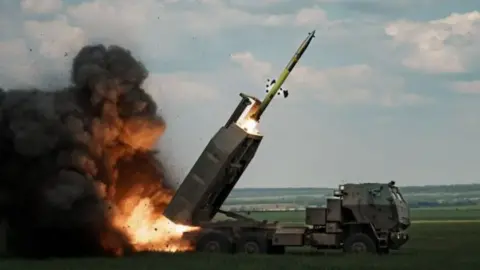 Getty Images
Getty ImagesPresident Joe Biden has hinted at Washington lifting restrictions on Ukraine using US long-range missiles against Russia.
If granted, it would fulfil repeated requests by Ukraine to loosen the limits on US-supplied weapons, which officials have said has left them fighting against Russia’s full-scale invasion with their hands tied.
Russia is yet to comment but President Vladimir Putin has previously said such action could lead to “very serious problems”.
Biden’s remarks come after US Secretary of State Antony Blinken accused Iran of supplying long-range ballistic missiles to Russia.
Asked by reporters if the US would lift restrictions on Ukraine’s use of long-range weapons on Tuesday, President Biden said his administration was “working that out now”.
Since Russia launched its full-scale invasion of Ukraine in February 2022, the US has been reluctant to supply or sanction the use of weapons that could strike targets deep inside Russia for fear it would escalate the conflict.
It has however loosened some of the restraints on such missile use, allowing Ukraine to use long-range missiles to strike areas along Russia’s border where troops are firing from.
Kyiv’s other allies have also been supplying some long-range weapons – with restrictions on how and when they can be used inside Russia, out of concern such strikes could prompt retaliation that draws Nato countries into the war or provokes a nuclear conflict.
In recent months Ukrainian President Volodymyr Zelensky has criticised the pace of weapons deliveries, and asked for authorisation to strike targets deep inside Russia with Western-supplied missiles – a move the US has thus far resisted.
Russia’s leader Putin also warned earlier this year that attacks by Ukraine on Russia with Western missiles risked triggering a wider war.
“Constant escalation can lead to serious consequences,” he said in May. “Do they want a global conflict?”
He added responsibility for any strikes inside Russia’s territory would lie with Western arms suppliers, even if Ukraine’s forces carried out the strikes.
Separately on Tuesday, the US, UK, France and Germany imposed fresh sanctions on Iran for supplying Russia with ballistic missiles for use in Ukraine.
Measures included restrictions on national carrier Iran Air’s ability to fly to the UK and Europe – as well as travel bans and asset freezes on a number of Iranians accused of facilitating military support for Russia.
Visiting London, US Secretary of State Antony Blinken said Russians had been trained by Iranian forces to use short-range ballistic missiles and that they could be deployed against Ukrainians within weeks.
The missiles are likely to boost Russia’s arsenal, enabling it to hit Ukrainian cities close to Russia’s borders or areas it already controls at the same time as it deploys its longer-range missiles deeper into Ukrainian territory.
Iran has repeatedly denied supplying such self-guided weapons to Russia.
UK Foreign Secretary David Lammy described Iran’s move as “a significant and dangerous escalation”.
Blinken and Lammy are travelling to Kyiv together on Wednesday, where they will meet President Zelensky.
Blinken said one of their goals ahead of the visit was to “hear directly from the Ukrainian leadership” about their “objectives and what we can do to support those needs”.




